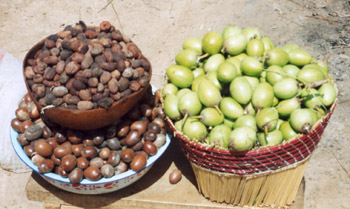| |
Shea (Butyrospermum paradoxum, Vitellaria paradoxa )
 |
Shea butter (Vitellaria paradox from West Africa and V. nilotica from East Africa) has been used for centuries in Africa for its unsurpassed ability to maintain and protect the skin from environmental damage and for cosmetic and food purposes. Shea Butter is used externally to protect the skin from sunburn, eczema, as skin rejuvenator, and for its exceptional healing qualities in scalp and hair care. The edible butter and used in the manufacturing of cocoa butter equivalent (solid fraction), and high quality Swiss chocolates, as well as a base for high quality cosmetics, and more recently in the aromatherapy industry. Shea butter is also used in the care of household pets as well as farm animals. Most shea butter products are manufactured manually, and in general without the use chemicals or bleaching agents.
For centuries, Africans massaged it on their body after washing, to relax muscles and soften the skin, especially during the dry/hot seasons. Shea butter has been used to treat sprains, wounds and colds. It is used as an aftershave and a hair balm as it fixes dry, brittle and damaged hair. In tropical Africa, animal husbandry is practically impossible due to the presence of sleeping sickness, caused by the tsetse fly. Many Africans depend on shea butter as their substitute for the valuable dairy butter, and it is used internally as a natural source of antioxidants and vitamin E. Mothers, who can afford the product use it frequently in diapers to avoid rashes and apply it to the skin of infants, and even apply it to the umbilical cord of newborn babies to facilitate rapid healing. The moisturizing and soothing properties of shea butter are largely due to the high content and composition of the essential fatty acids, such as triglycerides, unsaponifiables and waxy esters. The seed kernels contain about 50% of a fat consisting mainly of stearic (36-47%) and oleic (33-50%) acids. The unsaponifiable fraction (2-11%) is composed of phenols: tocopherols, triterpenes (a-amyrin, lupeol, butyrospermol, parkeol), steroids (campesterol, stigmasterol, �-sitosterol, a?spinasterol, delta-7-avenasterol) and the polyisoprenic hydrocarbon kariten (up to 2%). Due to its richness in cinnamic acid, and other components, shea butter can be used in the formulation of sun products against UV rays, skin lotions, and shampoos. Clinical observations suggest that shea butter increases local capillary circulation, which in turn increase tissue re-oxygenation and improves the elimination of metabolic waste products. It has anti-oxidizing and regenerating properties due to its richness in tocopherols, and other substances. French dermatologists tested 35 people, of different age, sex and racial backgrounds, for a period of ten days to 5 months, with shea butter for skin disorders ranging from dry and wrinkled skin to serious burns, rashes. They observed substantial healing in all cases, with no adverse effects.
Shea butter is highly regarded in the cosmetic field because of its high emolliency and moisturization capacities, but also as an occlusivity lipid replacement. It is also believed that its unsaponifiable content is beneficial for healing of damaged skin. Moreover, in current cosmetic practice, the trend toward the use of natural materials has become fully entrenched and as such, the demand for quality shea butter is very likely to increase. Shea butter also offers a high potential as a carrier material for essential oils used in aromatherapy. New products from shea butter are likely to increase as the product shows such promise as a moisturizer and retaining the elasticity of the skin. The unusually high content of unsaponifiables, also makes it an excellent fatting agent in soap making. Cosmetic and soap making industries can use shea butter to formulate cosmetics, soaps, shampoos, creams and balsams for hair and other skin cleansing and rejuvenating products. Shea butter is a safe product that can replace animal or bird products.
Natural shea butter is extracted from the pit of a fruit that grows only on the magnifolia tree in Central and Western Africa. The pits are taken from the fruit, boiled, and then sun dried for 3 - 5 days before they are roasted to complete dehydration. Afterwards, the shea butter is extracted by hand from the pit of the fruit. This long and arduous process has provided what is commonly called -The most beneficial all-natural skin product today.
Shea butter is now becoming one of the best-selling and most highly recommended skin care products found. Dermatologists everywhere are starting to recommend this product to their patients. Many cosmetic companies in France and the USA are putting shea butter in their products. In order for you to fully enjoy the benefits of this product it might help you to know how shea butter can work specifically for you and your customers.
Healing properties: Shea butter has a vast number of proven healing properties stemming from its physical makeup of vitamin E, vitamin A and cinnamic acid to name a few. Shea butter ingredients increase the healing of wounds and improve scars. It is commonly used in the treatment of eczema, rashes, burns, and severely dry skin. According to one of our customers -Nothing cured my eczema like shea butter. I have been using medications from my doctors for years, but as soon as I took shea butter I had amazing results.
Skin protection: Shea butter contains natural UV sun protection. Daily use of shea butter on the face and body drastically reduces sun exposure, which in turn slows down the rate of aging due to external factors. Shea butter also acts as a natural mantle against elements of cigarette smoke, smog and chemical pollutants in the atmosphere.
Skin miniaturization: Shea butter leaves skin smooth, supple and soft. It is rapidly becoming the #1 moisturizing agent used today. It quickly provides stretch mark prevention and healing, as well as healing of bruises and burns.
Here is a quick reference list of the benefits of shea butter:
- Helps heal scars, burns, and stretch marks.
- Shea butter can prevents ashy skin, chapping, and skin rashes.
- An ideal hair dressing that protects the scalp from sores and rashes and prevents dandruff.
- Helps prevent weak hair from breaking, fading, or thinning out.
- Fortifies cuticles and nails.
- Helps bruises to heal.
- You can drain toxins from sore muscles with shea butter: perfect for sports participants.
- Helps prevent skin irritation for babies: used for generations to help babies sleep better.
- Use shea butter after shaving to prevent irritation and restore skins natural luster.
- Ideal for dry skin, dermatitis, eczema, sunburn and athletes foot.
- Shea butter rejuvenates skin pores and adds elasticity to skin.
- Shea butter firms up aging skin and helps clear wrinkles.
- Massage shea butter into areas affected by arthritis, join pains, or other muscular ache.
- Shea butter naturally contains vitamins A and E.
Shea Oil has similar properties and provides similar benefits to the sking. It is:
Extremely high in Vitamins A, E and F.
Provides skin with all the essential elements it needs for good balance, elasticity and tone.
Our African Shea Oil is processed according to Fair Trade standards and traditional methods by West African women. Simply the best for fine lines and wrinkles, African Shea Oil penetrates deep into the skin rejuvenating damaged cells and restoring elasticity and tone. Naturally hypo-allergenic and safe for sensitive skin, nothing protects against sun wind and weather better than African Shea Oil.
Only high quality, unrefined Shea Oil can offer the healing benefits mentioned above. Once Shea Oil is aged or loses its natural integrity through high heat refinement, many of these wonderful benefits are lost. Although moisturizing, Shea Oil that has been over processed, bleached and deodorized, is ineffective in healing most skin conditions. That is why we use only cold pressed, unrefined Shea Oil.
Disclaimer: The information presented herein is intended for educational purposes only. These statements have not been evaluated by the FDA and are not intended to diagnose, cure, treat or prevent disease. Individual results may vary, and before using any supplements, it is always advisable to consult with your own health care provider.
|
|


















